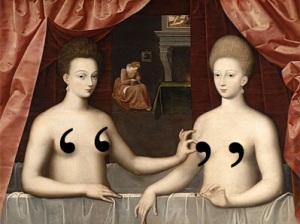Why do we quote others? Specifically, why do we quote famous people? Presumably it’s to give weight to the point we’re trying to make: If you won’t take it from me, take it from Albert Einstein.
Better yet, if you won’t take it from me, you’ll take it from me if you see I’ve taken it from Albert Einstein.
Quoting Einstein is a no-brainer. School and PTA newsletters quote him all the time. The logic here is interesting: If what Einstein says is true (and of course it’s true, because he’s a genius), then the point we’re trying to make — about education or school spirit or the bake sale — by quoting him must also be true, and you’d be a fool to dismiss it.
Einstein, of course, wasn’t a genius about everything. And I wonder if people would fall in line behind a quotation from him about marriage or relations between the sexes the way they seem to behind “The true sign of intelligence is not knowledge but imagination.”
I found that quotation on a calendar which had something wise and pithy from somebody wise and pithy for every month of the year. It’s where I found this quote from Aristotle: “Wit is educated insolence.”
I’m beginning to doubt that these famous, wise and deep people actually said the things that are attributed to them. Can you imagine Aristotle saying that wit is educated insolence? Could he have actually said that in Classical Greek? And if he had, did it mean the same thing as it does in modern English? Was Aristotle’s concept of wit the same as ours?
Many times quotations are used to demonstrate to the reader what a failure he is: “A man who dares to waste an hour of time has not discovered the value of life,” the calendar quotes Charles Darwin, who must never wasted an hour of his life unlike, say, me.
“Every man is guilty of all the good he did not do,” wrote Voltaire. And I feel guilty as charged.
What Einstein is to genius, Gandhi is to virtue. And so the calendar quotes him saying, “We must become the change we want to see.” I’d probably agree if I understood what that means.
Another thing these quotations have in common is a complete absence of humor. This makes them catnip to organizations and institutions that are trying to assert their moral authority without making any waves.
But if these men did say or write these things, perhaps they did it as hack work. Like celebrities today do commercials for the money, perhaps Emerson and Voltaire and the others earned extra cash by penning these deep-sounding but otherwise banal one-liners.
To rise above the cheapening of the Einstein and Gandhi brands from over-exposure, we might be forced to come up with our own quotations.
Something like: “The secret of life is no secret if we keep it to ourselves.”
“Wisdom is wise and also dumb.” Or: “Wisdom without wis is just dumb. (I admit, these need some work.)
“The true path to meaning is not knowing, but not knowing.”
“I would rather eat my dog than fail to help my fellow man.”
Please add yours.














